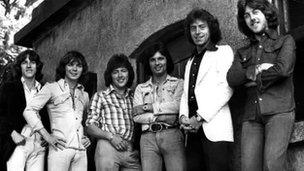Miami Showband massacre: HET raises collusion concerns
- Published

Three members of the Miami Showband were killed by loyalists in 1975
The families of three men shot dead in the Miami showband massacre have said a report into the killings indicates an RUC Special Branch agent was involved.
Three members of the band were shot dead in July 1975 after their minibus was stopped by a fake army patrol.
The HET report found that UVF man Robin Jackson had been linked to one of the murder weapons by fingerprints.
Jackson claimed in police interviews he had been tipped off by a senior RUC officer to lie low after the killings.
Police headquarters was told about that, but nothing was done.
The Historical Enquiries Team report said that Jackson, a leading mid-Ulster UVF member also known as "the Jackal", claimed that he was tipped off that his fingerprints had been found on a silencer attached to a Luger pistol used in the murders.
The HET said the murders raised "disturbing questions about collusive and corrupt behaviour".
It said the review "has found no means to assuage or rebut these concerns and that is a deeply troubling matter".
Jackson went on trial in November 1976 charged with possession of the silencer.
A judge rejected his defence that his fingerprints were on tape around the gun and had been innocently transferred.
However, the judge acquitted him, saying this did not prove that Jackson knew that he was in possession of a Luger silencer, nor did it show that he had agreed to such possession.
Fake patrol
The fake army patrol was made up of soldiers from the Ulster Defence Regiment (UDR) and members of loyalist paramilitary group, the Ulster Volunteer Force (UVF).
The Miami Showband was travelling home to Dublin after a gig in Banbridge, County Down, when the minibus was stopped at a roadblock.
The members of the band were made to line up at the side of the road while one UVF member tried to hide a bomb on the bus. The plan was that the bomb would explode en route killing everyone on board.
But the bomb went off prematurely, killing Harris Boyle and Wesley Somerville - who were members of the UDR, as well as being in the UVF.
After the explosion the other members of the UVF gang opened fire on the band, killing lead singer Fran O'Toole, guitarist Tony Geraghty, and trumpeter Brian McCoy.
The bass player Stephen Travers was also seriously hurt and barely survived his injuries.
Three members of the UDR were eventually convicted for their part in the attack.
James Somerville, Thomas Crozier and James McDowell all received life sentences, and remained in jail until their release under the terms of the Good Friday Agreement.
'Mind-blowing'
Commenting on the report, band member Des McAlea, who survived the attack, said: "It's been a long time but we've got justice at last."
He described the HET findings as "quite shocking" and "mind-blowing".
"The fact that there was collusion in this is such a tragedy for all of us concerned," he said.
"To think that people who were supposed to be protecting us and they were actually involved in this terrible tragedy."
Mr McAlea, who emigrated from Ireland after the murders, said he relived the "terrifying" events of the night every day of his life.
Stephen Travers, who was seriously injured, recalled the moments before the shooting started.
"The last thing that Brian McCoy did was nudge my elbow with his as we had our hands on our heads and gave his complete and total trust to the people who were questioning us, because he said they were British army.
"Within less than a minute these people he gave his complete trust to murdered him."